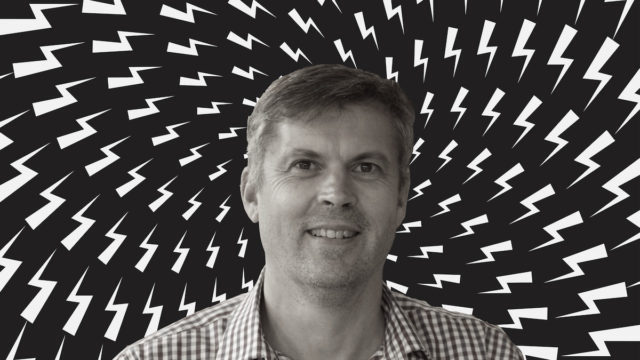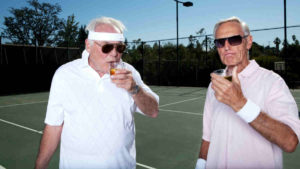Dr Boreham’s Crucible: A Pfizer takeover could make Resapp a genuine chestbeater

Judging from the hype of overly excited CEOs of even the earliest stage biotechs, cashed-up big pharma acquirers are queuing to make lucrative takeover offers for their (inevitably) unique and game-changing products and potions.
The reality is sobering: according to Biotech Daily’s archives, fewer than 10 ASX-listed biotechs have been taken over in the last 13 years (scrip-based mergers excluded).
The biggest and most recent was the keenly competed $1.67 billion buyout of Sirtex Medical by Chinese interests in 2018, which closely followed Merck’s $502 million take-out of Viralytics.
Other notable examples were Heartware (acquired for $1.36 billion in 2013), Cellestis (for $365 million in August 2011) and Peplin (for $348 million in November 2009).
So, it’s always noteworthy when a company looks like joining this elite club, as is the case of the smartphone based respiratory diagnostics house Resapp (ASX:RAP).
Pfizer is offering 11.5 cents a share cash for Resapp, which has just started to commercialize its algorithm-based tool that detects common maladies based on the “signature” – or sound – of the patient’s cough.
The patient simply coughs five times into the phone and a clever ‘algo’ works out what’s going on in the bellows.
Yep – we’re talking about the millennial equivalent of the stethoscope – the favored prop of medical TV drama producers ever since soapies were invented.
By way of a scheme of arrangement, Pfizer’s circa $100 million tilt comes as Resapp plays up the ability of its software to detect Covid-19 with its cough-into-the-handset technique.
Take a deep cough …
Auscultation – the art of listening to a chest to ascertain the diseases within – has been practiced for 2,000 years. Stethoscopes have been around for more 200 years. The trouble is, the instrument is notoriously prone to operator error.
As experienced chest whisperers would attest, pneumonia, asthma, bronchiolitis and upper tract infections all emit different patterns, as does chronic obstructive pulmonary disease (COPD). Heart failure can cause fine crackles at the base of the lungs.
Resapp was founded in 2015 by Dr Tony Keating and Perth entrepreneur Brian Leedman.
The company listed via the back door on the ASX in July 2015, with the company raising $4 million capital at 2.0 cents apiece.
The algorithm itself was devised by University of Queensland Prof Udantha Abeyratne, initially for sleep apnoea. The focus then changed to detecting chest diseases simply from the sound of the cough.
“Since then, we have developed the technology further and have become the world’s leader in auditory diagnosis of respiratory health,” Dr Keating says.
With a grant from the Bill and Melinda Gates Foundation, the application eventually emerged from the laboratory.
Funded by the now estranged Bill and Melinda, Resapp ran a paediatric study at Indonesia’s Sardijto Hospital, in 2013. The foundation’s motivation was tackling pneumonia in children, a major killer in the Third World.
This effort was followed up by studies at Perth’s Joondalup Health Campus and Princess Margaret Hospital, which initially came up with breathtakingly good results for bronchiolitis, pneumonia and asthma detection.
Your columnist’s advancing age and declining synapses means he can’t quite remember the ins and outs, but in August 2017 Resapp the shares fell as much as 82 percent on news that the 1,245-patient Smartcough-C trial failed to meet its endpoints for the accurate diagnosis of respiratory disease.
Resapp blamed the poor results on factors such as a second person’s cough being heard on the recording. In any event, the caravan moved on and the company’s lead product Resappdx won Australian and European approval in 2019 and, later, in Indonesia.
As is often the case, the US Food & Drug Administration has proved a harder nut to crack.
Take your partners
Resapp has attracted multiple partners in multiple countries – but until now Pfizer wasn’t mentioned in dispatches.
In Australia, the tool is deployed by telehealth providers such as Doctors on Demand and, in the aged care sector, Heath Teams.
In Europe, the company last year partnered with telehealth provider Medgate AG. This month the company signed up a British component of the National Health Service, the Kent-based Dartford and Gravesham Trust.
Based around a large hospital in North Kent, the trust is trialling the tool in outpatient clinics.
In Asia, the company works with telehealth providers Alodokter in Indonesia and Homify in the Philippines
In November last year, Resapp signed a deal with Johnson & Johnson subsidiary Janssen to use Resappdx to diagnose acute respiratory disease in a multi-country study of respiratory syncytial virus (RSV) patients.
RSV claims about 160,000 lives a year.
“These companies don’t do business unless they have a very sound foundation for the technology,” Dr Keating says.
Resapp is also looking at partnerships for its sleep apnoea screening tool, Sleep Check DTC.
Covid cough medicine
Resapp’s schtick is that the tool can diagnose Covid much more accurately than a rapid antigen test (RAT) and with about the same reliability as a gold-standard, lab-based PCR (polymerase chain reaction) assay.
“Covid is a really important commercial opportunity,” Dr Keating says. “This virus isn’t going away. The world is learning to live with it, but learning to live with it means learning to manage it.”
Dr Keating says the RATs are less reliable because of the discomfort of the swab-up-the-nose procedure. “If the swab does not get the right bit of nose, it will be inaccurate.”
And as anyone who queued for a pre-Christmas PCR test would attest, waiting a week for a result in this ‘Covid normal’ world simply doesn’t cut it, either. That said, post-Christmas, most results are same day.
In its seminal clinical trial, the company recruited 700 participants in the US and India – 400 of them Covid-positive.
The Resapp result was compared with both PCR tests and RATs.
In what Dr Keating dubs “excellent” results, the Resapp algorithm picked up 92 percent of positive cases, compared with the RAT reliability of 60 to 80 percent.
The test also accurately confirmed 95 per cent of negative cases.
As a low-cost screening tool, the test could reduce the need for follow-up RATs by about 80 percent.
One nuance is that coughing is not necessarily a Covid symptom – and it doesn’t have to be. The cough can be ‘fake’ – the sort a non-smoker makes when subject to the wisp of a puffer’s fumes – as long as it brings up sound from which the data can be derived.
Resapp is now talking with the Australian Therapeutic Goods Administration and US Food and Drug Administration about carrying out a larger double-blinded trial.
“We are in discussions with a number of parties to bring this product to market,” Dr Keating says.
He says the software application could be used by airlines for mass pre-flight passenger checks, or alongside a government check-in application. It could also be incorporated into a smart-phone, alongside all those other pre-loaded tools of varying worth.
The integrity of the tests could also be enhanced via fingerprint or facial recognition now common on smartphones.
“We’re talking to pharmaceutical companies, tech companies, government and any number of big organisations who can help us bring this technology to everyone’s home,” Dr Keating said a couple days ahead of the Pfizer news.
Finances and performance
Resapp recorded revenue of $80,900 for the second half to December 2021, 75 percent better than previously. The company had chalked up revenue of $69,700 in the full year to June 2021, its first year of commercialisation.
Resapp lost $3.6 million during the half year, compared with a $3.1 million deficit previously. The cash balance was $3.4 million, a 49 per cent reduction year-on-year.
Announced on Monday April 11, the Pfizer takeover offer is pitched at a 28 premium to the previous Friday’s close and close to a 40 per cent premium on the volume-weighted three-month price.
The offer is by way of a scheme of arrangement, which means that shareholders get to vote on the deal. Such schemes require the consent of 75 per cent of holders by value and 50 per cent by number.
Unlike an unconditional on-market offer the outcome is binary – the company is either 100 per cent acquired or it’s not at all.
But there’s an interesting addendum: a research and development licensing agreement between Pfizer and Resapp to develop the Covid product. This deal will stand, even if the shareholders reject the takeover proposal.
Initially for six months, the compact entails a $3 million up-front licensing fee to be paid to Resapp, with up to $1 million of milestone payments based on clinical trial recruitment.
The scheme booklet is due out in mid-May, with a shareholder vote expected in mid-June and implementation later that month.
Over the last 12 months, Resapp shares have traded between an all-time low of 4.0 cents (July 2021) and the current level.
The stock peaked at a lofty 50 cents in September 2016.
Resapp (ASX:RAP) share price today:
Dr Boreham’s diagnosis:
In relation to Pfizer’s offer, management’s advice is pretty much ‘take the money and run’.
Or in Dr Keating’s more formal phraseology: “We believe the material premium and certainty of an all-cash offer consideration is an attractive outcome for shareholders.”
More broadly, Dr Keating says, Resapp saw the advent of home and remote telehealth well before anyone else.
“The world is shifting to testing at home, whether it’s for ’flu or diabetes … we are leading the field in cough-based analysis.”
Give that, some investors might be wondering whether they’re missing out on much more substantial upside. Apparently, some have voiced their ire on social media to that effect.
Maybe they’re right, but Resapp’s modest revenue and cash position means the full commercialisation path would be a bridge too far without some sort of third-party support.
Pfizer’s line is that the proposed acquisition (and research collaboration) adds to the company’s growing capabilities in a new era of digital health.
But the $US300 billion market cap Pfizer could well be saying: “100 million Aussie dollars is chump change to us, so it’s worth a shot, goddamit.”
Time will tell, but we’re not holding our breath.
We expect the acquisition will be completed without the need for Pfizer to cough-up more dough, and the sun will set on Resapp’s topsy-turvy eight-year ASX adventure.
Disclosure: Dr Boreham is not a qualified medical practitioner and does not possess a relevant qualification of any sort – or even a stethoscope. But he has watched Marcus Welby MD and General Practice on occasions, so is adequately endorsed for the task.
This column first appeared in Biotech Daily

UNLOCK INSIGHTS
Discover the untold stories of emerging ASX stocks.
Daily news and expert analysis, it's free to subscribe.
By proceeding, you confirm you understand that we handle personal information in accordance with our Privacy Policy.








